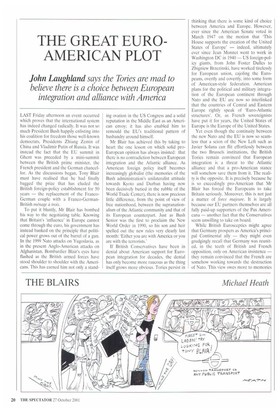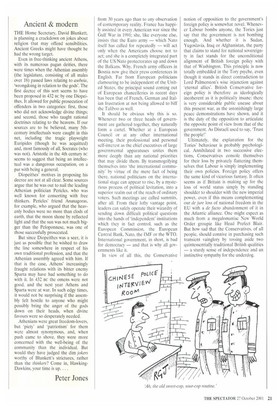THE GREAT EURO AMERICAN PLOT
John Laughland says the Tories are mad to
believe there is a choice between European integration and alliance with America
LAST Friday afternoon an event occurred which proves that the international system has indeed changed radically. It was not so much President Bush happily enlisting into his coalition for freedom those well-known democrats, Presidents Zhiang Zemin of China and Vladimir Putin of Russia. It was instead the fact that the EU summit in Ghent was preceded by a mini-summit between the British prime minister, the French president and the German chancellor. As the discussions began, Tony Blair must have realised that he had finally bagged the prize that has eluded the British foreign-policy establishment for 50 years — the replacement of the FrancoGerman couple with a Franco-GermanBritish menage a trots.
To put it bluntly, Mr Blair has bombed his way to the negotiating table. Knowing that Britain's 'influence' in Europe cannot come through the euro, his government has instead banked on the principle that political power grows out of the barrel of a gun. In the 1999 Nato attacks on Yugoslavia, as in the present Anglo-American attacks on Afghanistan, Bombardier Blair's eyes have flashed as the British armed forces have stood shoulder to shoulder with the Americans. This has earned him not only a stand ing ovation in the US Congress and a solid reputation in the Middle East as an American envoy; it has also enabled him to remould the EU's traditional pattern of husbandry around himself.
Mr Blair has achieved this by taking to heart the one lesson on which solid proEuropean opinion has always insisted: that there is no contradiction between European integration and the Atlantic alliance. As American foreign policy itself becomes increasingly globalist (the memories of the Bush administration's unilateralist attitude towards Kyoto and Durban having now been decisively buried in the rubble of the World Trade Center), there is now precious little difference, from the point of view of free nationhood, between the supranationalism of the Atlantic community and that of its European counterpart. Just as Bush Senior was the first to proclaim the New World Order in 1990, so his son and heir spelled out the new rules very clearly last month: 'Either you are with America or you are with the terrorists.'
If British Conservatives have been in denial about American support for European integration for decades, the denial has only become more raucous as the thing itself grows more obvious. Tories persist in thinking that there is some kind of choice between America and Europe. However, ever since the American Senate voted in March 1947 on the motion that 'This House supports the creation of the United States of Europe' — indeed, ultimately ever since Jean Monnet went to work in Washington DC in 1940 — US foreign-policy giants, from John Foster Dulles to Thigniew Brzezinski, have worked tirelessly for European union, cajoling the Europeans, overtly and covertly, into some form of American-style federation, American plans for the political and military integration of the European continent through Nato and the EU are now so interlinked that the countries of Central and Eastern Europe rightly speak of 'Euro-Atlantic structures'. Or, as French sovereignists have put it for years, the United States of Europe is the Europe of the United States.
Yet even though the continuity between the new Nato and the EU is now so seamless that a scion of the New Left such as Javier Solana can flit effortlessly between the two Brussels institutions, the British Tories remain convinced that European integration is a threat to the Atlantic alliance and that a pro-American stance will somehow save them from it. The reality is the opposite. It is precisely because he is so exceedingly pro-American that Mr Blair has forced the Europeans to take Britain seriously. Moreover, this is not just a matter of force majeure. It is largely because our EU partners themselves are all fully paid-up supporters of the Pax Americana — another fact that the Conservatives seem unwilling to take on board.
While British Eurosceptics might agree that Germany prospers as America's principal Continental ally — they might even grudgingly recall that Germany was reunited, in the teeth of British and French opposition, only on American insistence — they remain convinced that the French are somehow working towards the destruction of Nato. This view owes more to memories from 30 years ago than to any observation of contemporary reality. France has happily assisted in every American war since the Gulf War in 1991; she, like everyone else, insists that the Euro army — which Nato itself has called for repeatedly — will act only when the Americans choose not to act; and she is a completely integrated part of the US/Nato protectorates up and down the Balkans. Why, French army officers in Bosnia now give their press conferences in English. Far from European politicians clamouring to be independent of the United States, the principal sound coming out of European chancelleries in recent days has been that of French, German and Italian frustration at not being allowed to biff the Taliboo as well.
It should be obvious why this is so. Whenever two or three heads of government are gathered together, they naturally form a cartel. Whether at a European Council or at any other international meeting. their professional and personal self-interest as the chief executives of large governmental apparatuses unites them more deeply than any national priorities that may divide them. By transmogrifying themselves into 'the international community' by virtue of the mere fact of being there, national politicians on the international stage can appear to rise, by a mysterious process of political levitation, into a superior realm out of the reach of ordinary voters. Such meetings are called summits, after all. From their lofty vantage point, leaders can safely operate their wizardry of sending down difficult political questions into the hands of 'independent' institutions which they in fact control, such as the European Commission, the European Central Bank, Nato, the IMF or the WTO. International government, in short, is bad for democracy — and that is why all governments like it.
In view of all this, the Conservative notion of opposition to the government's foreign policy is somewhat novel. Whenever Labour bombs anyone, the Tories just say that the government is not bombing enough. And whether it is Sudan, Yugoslavia, Iraq or Afghanistan, the party that claims to stand for national sovereignty in fact stands for the unconditional alignment of British foreign policy with that of Washington. This principle is now totally embedded in the Tory psyche, even though it stands in direct contradiction to Lord Palmerston's wise injunction against 'eternal allies'. British Conservative foreign policy is therefore as ideologically incoherent as it is politically insane: there is very considerable public unease about this present war, as the astonishingly large peace demonstrations have shown, and it is the duty of the opposition to articulate the opposite point of view from that of the government. As Disraeli used to say, 'Trust the people!'
Ultimately, the explanation for the Tories' behaviour is probably psychological. Annihilated in two successive elections, Conservatives console themselves for their loss by privately flattering themselves that Labour is simply implementing their own policies. Foreign policy offers the same kind of vicarious fantasy. It often seems as if Britain is making up for the loss of world status simply by standing shoulder to shoulder with the new imperial power, even if this means complementing our de jure loss of national freedom in the EU with a de facto abandonment of it in the Atlantic alliance. One might expect as much from a megalomaniac New World Order groupie like Head Prefect Blair. But how sad that the Conservatives, of all people, should connive in purchasing such transient vainglory by tossing aside two quintessentially traditional British qualities — a sturdy sense of independence and an instinctive sympathy for the underdog.











































































 Previous page
Previous page